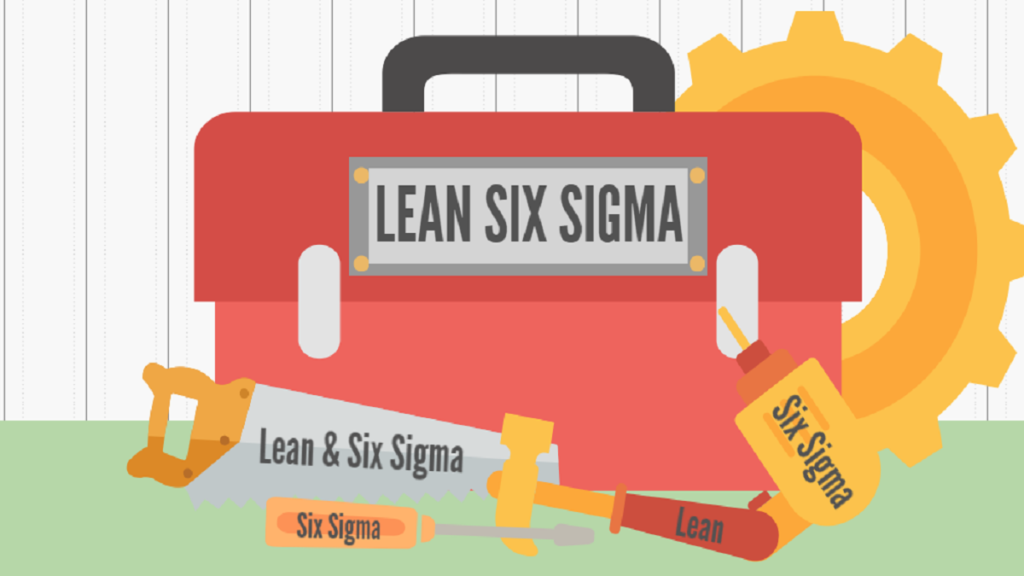
Jump ahead to
Introduction to Lean Six Sigma
Over two decades, Lean Six Sigma has become synonymous with Quality Management in businesses across all major industries around the world.
The process improvement methodology of Lean Six Sigma combines the principles of two powerful methods of Lean and Six Sigma to form one unique and impactful methodology.
Lean Six Sigma methodology is utilized in the quality improvement process of organizations to eliminate defects, remove waste, and increase productivity. This methodology improves the overall efficiency of the business process and maintains good workplace conditions for the employees while ensuring customer satisfaction.
In this continually changing economy, business organizations strive to streamline their processes to realize their visions and missions. Lean Six Sigma is vital in achieving organizational goals and outdistancing the competition.
The benefits of adopting the Lean Six Sigma methodology in the quality improvement process of a business can be discussed at length. However, here we will discuss how organizations can adopt Lean Six Sigma to improve their business process. The answer to that question is getting their quality management teams of professionals training and certification in Lean Six Sigma.
Why Lean Six Sigma Certification?
Lean Six Sigma Certification Training will be extremely helpful for quality management professionals involved in improving an organization’s business processes.
Through the Lean Six Sigma Certification and training, organizations are personally ensuring that their employees are skilled and knowledgeable in Lean Six Sigma principles.
Individuals or professionals interested in careers in the quality management sector are realizing the importance of having a Lean Six Sigma Certification on their resume.
Having a certification in Lean Six Sigma makes prospective employers recognize an individual’s commitment to demonstrating their knowledge and skills.
Organizations will notice their future employees have sufficient knowledge of Lean Six Sigma methodology and exhibit the skills needed to use Lean Six Sigma tools in improving their business processes.
Types of Lean Six Sigma Certification
The importance of certification and training in Lean Six Sigma cannot be overstated. The certificates in Lean Six Sigma have been categorized based on the expertise and skills gained.
The Lean Six Sigma certifications have borrowed the progression of mastery from the progression level associated with martial arts. Different organizations use different certification terms to describe the levels of certification in Lean Six Sigma. However, the most commonly used certificate is the Lean Six Sigma belt.
Lean Six Sigma Belts- White Belt, Yellow Belt, Green Belt, Black Belt, Master Black Belt, and Champion; each certification validates an individual’s knowledge and skills of Lean Six Sigma.
Let us discuss some of the most common Lean Six Sigma certification belts that organizations require while selecting potential employees in the industry nowadays.
Lean Six Sigma Yellow Belt Certification: The Yellow Belt Certification benefits working professionals and new quality management professionals who want to learn about the basics of Lean Six Sigma. Though the White Belt Certification serves the same purpose, Yellow Belt Certification holds much value as it validates a more in-depth knowledge of Lean Six Sigma.
Yellow Belt professionals are well-versed in Lean Six Sigma methodologies and demonstrate skills in using Lean Six Sigma tools. They are proficient in leading little improvement Six Sigma projects and serve as team members for larger projects led by Green Belt and Black Belt professionals.
Professionals with a Yellow Belt Certification in Lean Six Sigma are usually entry-level representatives who support the Six Sigma projects in the quality management process of an organization.
Lean Six Sigma Green Belt Certification: Green Belt Certified Lean Six Sigma professionals have demonstrated their knowledge and skill in leading small-scale Six Sigma projects. These professionals have a detailed understanding of Lean Six Sigma principles and are proficient in implementing Lean Six Sigma tools to improve the quality management process.
Professionals with Lean Six Sigma Green Belt Certification are the most sought-after quality management professionals. They are among the highest-paid quality management professionals across all industries around the globe.
Organizations prefer Green Belt Certified professionals in their quality improvement teams. They often assist Black Belt professionals in the problem-solving process of large Six Sigma projects.
Lean Six Sigma Black Belt Certification: Black Belt Certified professionals are experts in using Lean Six Sigma tools and methodologies. Along with an in-depth understanding of Lean Six Sigma principles, they have sufficient experience in quality improvement. These professionals lead large-scale Six Sigma projects of the business and are actively involved in the problem-solving and decision-making process.
Black Belt Certified professionals are team leaders who play a major role in overlooking the quality management process of an organization. They have demonstrated their knowledge and skills in the Lean Six Sigma methodologies.
Certification in Lean Six Sigma Black Belt will earn professionals immense credit and privileges. They can guide Green Belts and Yellow Belts in the organization’s Six Sigma projects.
The Lean Six Sigma Certifications can be earned through reputed training websites like Unichrone online. The blended training courses that combine traditional instruction methods with modern self-paced learning will greatly benefit working professionals.
Professionals who want to distinguish themselves in hiring should get certification and training in Lean Six Sigma.
Major advantages of Lean Six Sigma Certification
Organizations
Leaders and entrepreneurs constantly seek ways to achieve their organizational goals and get ahead of their competitors. Certifications in Lean Six Sigma can benefit organizations by keeping all their team members skilled and proficient in the principles of Lean Six Sigma for improved organizational productivity.
Some major benefits of Lean Six Sigma Certifications for organizations are listed below:
- Improved Overall Productivity: Lean Six Sigma certifications ensure employees know the organizational objectives. They work towards a shared goal, avoid wasteful steps, reduce production expenses, and make accurate predictions for the business process. This helps organizations attain their vision and mission of satisfying customers’ needs by providing quality products and services. Thus, ensuring the overall improvement in productivity of the organization.
- Increased Customer Satisfaction: Implementing Lean Six Sigma principles to the business process ensures minimal overall costs of the organization’s products and services. This fulfills the customers’ requirement of paying for what they need only. Thus organizations provide that their customers are happy, which leads to greater sales and profits.
- Reduction in Costs: The main advantage of Lean Six Sigma is to remove the wasteful steps in the business processes that affect productivity. These wasteful steps often lead to organizations sustaining huge expenses. Using the Lean Six Sigma methodology, employees can ensure that wasteful steps are avoided. Thus ensuring maximum productivity for the organizations.
- Simplified Processes: Lean Six Sigma simplifies business processes by measuring and analyzing data to produce the desired results. Simplified procedures are easier to control and manage, thus ensuring minimum errors and wasteful steps in the business. Lean Six Sigma Certified employees can predict the process life cycle and input-output time and manage the business processes accordingly. This, in turn, helps the decision-makers and leaders make strategic decisions that result in the business’s success.
- Higher Employee Involvement: One of the major benefits of applying the Lean Six Sigma principles to the business process is the involvement of every organization member. Organizations can ensure maximum productivity when employees work towards a common goal. Lean Six Sigma certifications help employees understand the importance of their role in improving the organization’s overall productivity. As a result, they feel more involved in the business process and directly impact the organizational objectives. A satisfied and productive workforce results in a successful business venture.
Individuals
Lean Six Sigma Certifications help improve the quality management process in an organization that leads to the business’s success. For individuals and professionals starting their careers in quality management, it helps them become Six Sigma leaders who drive business growth.
The most important advantages of Lean Six Sigma Certifications for individuals are as follows:
- Successful Career in Quality Management: A certification in Lean Six Sigma will help launch your career in the quality management sector across major industries. Individuals having an in-depth understanding of Lean Six Sigma methodology can address any problem in the quality improvement process of the organization they are hired in. Training and certification in Lean Six Sigma demonstrate a professional’s proficiency in problem-solving and applying various Lean Six Sigma tools. Being Lean Six Sigma Certified will open several job opportunities across multiple industries like manufacturing, IT, aerospace, electronics, healthcare, packaging, services, etc.
- Better Career-Growth: Certification in Lean Six Sigma enables professionals to become vital for improving the business processes in their organization. Thus, an in-depth knowledge of Lean Six Sigma and the ability to successfully apply Lean Six Sigma tools that comes with the Lean Six Sigma certifications ensures professionals have a successful career. Lean Six Sigma-certified professionals can choose to work in any industry worldwide.
- Higher Pay and Promotion Capability: Becoming a Lean Six Sigma Certified professional is difficult. There are studies involved and examinations to pass. However, it is extremely rewarding. Thus opting for training and certification in Lean Six Sigma will help you easily take that first step toward a rewarding and successful career in quality management. Lean Six Sigma Certified Professionals constantly rank among the highest-paid professionals across all major industries like telecom, manufacturing, supply chain, banking, finance, HR, IT, etc. Globally, the average salary of a Lean Six Sigma Certified professional is more than $100,000 per year.
- Gain Leadership quality: Attaining Lean Six Sigma Certifications will allow quality management professionals to actively participate in the decision-making and problem-solving processes of the organization. The skillset acquired through the training and certification in Lean Six Sigma prepares professionals to take up leadership roles in their organizations. In various industries, they can hold Senior Managerial positions such as Project Managers, Operations Managers, Management Consultants, etc.
- Promote Organizational Improvement: The most important role of a Certified Lean Six Sigma Professional is to help the organization in the quality improvement process. These qualified individuals assist their organization in maintaining high standards and greater productivity. The hands-on experience and detailed understanding of Lean Six Sigma principles gained through the training and certification help professionals tackle challenges faced in the real world.
Conclusion
Therefore, getting a Lean Six Sigma Certification will become the distinguishing factor when selecting the coveted job that individuals want to achieve. Individuals and organizations have discovered the proven benefits of the Lean Six Sigma certifications.
The next step for interested individuals is to find the right training and certification platform to enable them to enjoy the advantages mentioned above.
In this competitive and changing economy, certifications will help you stand out from the rest to get the job that you aspire to. From an employer’s perspective, you will feel relieved that all your employees understand what needs to be done to achieve business growth.



